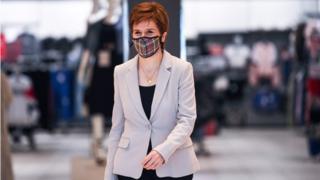Coronavirus: Face coverings to become mandatory in Scottish shops
 Image copyright
Getty Images
Image copyright
Getty Images
The use of face coverings will become mandatory in shops in Scotland from 9 July as coronavirus restrictions are eased, Nicola Sturgeon has said.
Non-essential shops have reopened in Scotland and bars and restaurants are due to open up again later this month.
The first minister said the 2m physical distancing rule would be eased for some premises when the country enters the next "phase" of its routemap on 9 July.
And she said face coverings would be mandatory in shops from that date.
Ms Sturgeon also announced that children under the age of 12 would no longer need to maintain physical distancing from other households from Friday.
The first minister had ordered further scientific study of the 2m (6ft 6in) physical distancing rule after it was announced a "one metre plus" system would be introduced in England.
She said advice was clear that "as the distance between people decreases, the risk of transmitting the virus increases", but said this could be "mitigated by other measures".
'Serious economic implications'
The first minister said the "general advice will remain unchanged" and that "as far as possible" people should remain 2m away from other households.
But she said in view of the "serious economic implications" of maintaining the rule in all circumstances, she would allow "exemptions for specific sectors" where a 1m (3ft 3in) distance could be used if other safety measures are introduced.
An example of this would be a pub or restaurant being allowed to relax the physical distancing rule when they can reopen from 15 July if plastic screens are used to separate customers, or better ventilation is installed.
The change to the distancing rule will be introduced from the start of "phase three" of the government's "route map" towards lifting lockdown, currently set to be reviewed on 9 July.
And Ms Sturgeon said that from the start of phase three, the use of face coverings would become mandatory in shops, with exemptions for young children and people with certain health conditions.
She said that using face coverings was "one thing we can do to reduce risk, not a substitute for other things".
"We have proceeded for a period with a voluntary approach to this," she said. "Some people are complying and some are not, I'm not pointing fingers or trying to blame people for that but we have to make a judgement if we're heading into a period where more people are interacting.
"And we've been having a discussion with more sectors like retail about reducing distancing, and that increases the importance of mitigations like face coverings."